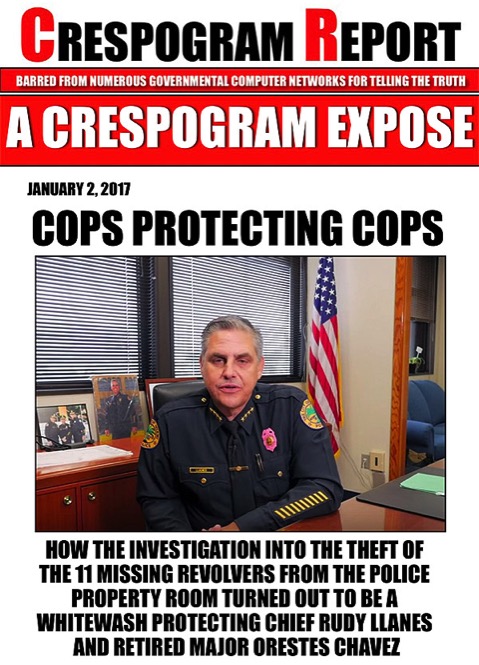
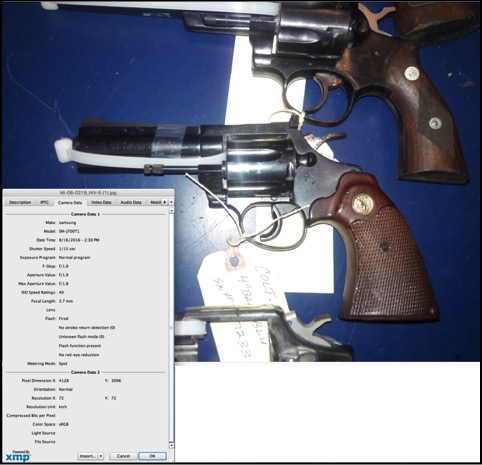
Lt. Vincent Laricci Audio
If you look at the dates when these statements were given, you will see that by the time Chavez was questioned, the investigators already had statements refuting his claim that he last saw the pistols on the table in the Property Room.
In neither the IA Summary, or on the audio tape of the FDLE voluntary statement given by Chavez on March 1, 2017, does an IA detective, or Special Agent Stein ask:
'Major, you say that you last saw the guns on the
table inside the Confiscation Area of the Property
Room. Are you aware that there are 3 separate
statements by the other people who were in that
room with you, that when you left, you walked out
with Sergeant Forbes who says he carried the box
with guns out with you, and that he gave them to
you at the door to his office? Do you have anything
you'd like to say about those claims?'
Unlike the detectives in a TV show, the real "detectives" in this case when presented with an opportunity to ask the kind of question that addresses an obvious contradiction between Chavez's and the others in the room at the time chose to ignore the possibility that he was committing perjury, and instead gave him a free pass.
This question is just one of several extremely obvious unasked questions that supports the belief of many within the Miami Police Department that from the beginning the so-called investigation into the theft of these guns was destined to be a whitewash..
PART VI - THE CHIEF PROVIDES AN ALIBI FOR CHAVEZ
Before we get deeper in the weeds with Chavez, Forbes and these statements, let's take a detour and deal with the person at the very center of this gun theft, Miami Police Chief Rudy Llanes.
From the day that these pistols were initially discovered in the shipping container under I-95, until today, the person whose was the motivating force in this incident has been Chief of Police Rudy Llanes, who, wanting a momento of his time as a Police Explorer, hoped that one of those pistols found in the shipping container might have been the one that he used as an Explorer at shooting matches.
From the beginning it was clear that no one else - even Major Orestes Chavez - had any intrinsic interest in these guns.
As Sergeant Forbes is heard to say in the audio tape of his interview, his unit was responsible for destroying thousands of guns every year, and in fact the Property Unit Weekly Report issued on October 11, 2016, details the destruction of these 772 guns that occurred on September 27, 2016 that has been offered up as a smoke screen for what might happened with the pistols.
Here is the summary of Llanes statement made to the detectives in IA.
If this case had involved lower ranking police officers instead of two high-ranking cops, including the Chief of Police, I doubt very seriously that the above conclusion would have ever been reached, or that the investigation that led to this conclusion would have been handled in the way that it was.
In fact, after 6 months of brazen stonewalling by both the City of Miami and the Florida Department of Law Enforcement (FDLE) to release the documents and interviews related to this case, I contend that the 4 audio tapes of the interviews that I was finally able to obtain reveal that this wasn't an investigation as much as it was a calculated game of Patty-cake between the FDLE Agent Stein, Miami Police Chief Rudy Llanes and now retired Major Orestes Chavez.
PART I - WE SHOULD EXPECT BETTER FROM THE FDLE
For the last 8 years, I've considered Special Agents of the Florida Department of Law Enforcement (FDLE), to be the "good guys" in the struggle to clean up the corruption at Miami City Hall.
It was the FDLE's investigative reports - including copies of the audio tapes of the wire that former Police Chief Exposito wore after he received what he believed to be an offer of a $400,000 bribe by Mayor Tomas Regalado that was handled by Chief Financial officer Larry Spring to get him to retire as a way to end the fight over the illegal maquinita machines that the Chief was having with the Mayor that led to my first real scoop..
It was FDLE investigative reports that revealed how Howard Rosen, then the Division Chief of the Miami State Attorney's Office of Public Corruption allowed Tomas Regalado and his daughter Raquel to evade criminal prosecution and removal from office - over the handling Regalado's campaign accounting in his first run for Mayor.
It was also FDLE Special Agents who doggedly went after Willie Gort for not only accepting $18,000 in unreported in-kind campaign contributions from one of the billboard companies that had a contract with the city, but in addition discovered that Gort's campaign accountant - whose wife was a senior member of Regalado's staff - had ordered an employee to cook the books to shield some campaign donations from public scrutiny.
Days after Special Agent Jeffrey Promerantz went to Assistant State Attorney Tim VanderGieson, Rosen's replacements as the Division Chief of the Miami State Attorney's Public Corruption Unit to ask for a subpoena to seize Willie Gort's office computer, the case was summarily closed by VanderGieson.
Like I said, in all of these cases, I considered the FDLE Special Agents as the "good guys," using ALL of the investigative tools that they could in order to build cases, and consequently because I believed them to be doing the best that they could within a corrupt system that allowed Miami-Dade State Attorney Katherine Fernandez and her minons to shut down cases in order to provide protection via the Family and Friends Plan to favored Cuban politicians,
I've continued to contact the agency whenever I've discovered information that I believed crossed the threshold from political chicanery to outright criminal behavior.
Because of the level of trust and respect that I put in the agents that I dealt with, it cheered me when the decision was announced to remove the investigation of the 11 missing police revolvers from the City of Miami Police Property Room from MPD Internal Affairs, to the FDLE. I actually thought the decision to transfer the investigation to the FDLE would lead to a real investigation.
I was wrong.
PART II - THE HISTORY OF THE PISTOLS
On August 2, 2016, Miami Police Officer Jonathan Green prepared Incident Report 234887, detailing the discovery of 11 revolvers, 3 rifles and a sizable quantity of ammunition in a shipping container under the I-95 Overpass across from police headquarters. ( You can see pages 4,5 & 6 of the report that details the guns found by their serial numbers and the explanation of how they were found HERE.)
When the guns were found, they were immediately transported to the Property Room, where they were placed in the Confiscation area of the Property Room, supervised by Sergeant Alvin Forbes, and where soon after, it was determined that these guns had been used back in the 1980's by the Miami Police Explorer's Club Shooting Team.
In my original reporting last year, I mistakenly stated that Chief Rudy Llanes had been in charge of this team. I was wrong. He had been an Explorer and a member of the team.
PART III - THE CHIEF WANTS TO SEE THE PISTOLS
According to the statement made by Sergeant Alvin Forbes to Internal Affair's after they opened an investigation into the missing revolvers, days after the guns were found, Major Orestes Chavez engaged in a back and forth communication with the Chief about the guns and then informed Forbes that the Chief was interested in whether the "38 Colt Python" he had used in competition was among the pistols found and whether the Blue box was found with the guns.
After being told by Forbes that the box had been destroyed because it was in such bad condition, and that there were no Colt Python's in the collection of revolvers found, Chavez then informed Forbes that the guns should not be destroyed because the Chief also expressed an interest in saving the guns for possible inclusion in a police museum.
Forbes stated that he notified his staff in the Confiscation Unit about this decision from the Chief, and then on August 16, 2016, Major Chavez showed up at his office to tell him that Chief Llanes waned to see the guns.
We know that this is the actual day that Chavez came to see the guns because of the metadata imbedded in the File Info of the photos of the pistols that he took of the pistols that day.
According to the sworn statements of Forbes and his staff, when Chavez showed up at Forbes office and told him he wanted to look at the pistols, Forbes walked him back to the area where the pistols were kept, and after they were removed from the storage area, they were placed on a table where Chavez took photos of the pistols, including the photo above.
(All of the statements referenced in this story are part of the Miami Police Department's IA Report/ CloseOut Memo, and can be found HERE.)
PART IV - HOW I OBTAINED THE INFORMATION THAT SUPPORTS THE BASIS FOR THE REMAINDER OF THIS STORY
It is at this point, that either the 11 pistols mysteriously disappeared as a result of gross incompetence and mismanagement - the official position taken by the FDLE - or that they were given to Major Chavez by Sergeant Forbes, who then walked them out of the Property Room, never to be returned.
While there has been some effort to sow confusion about what happened that day, the one thing that there is no confusion about is that proper procedures were not used by Forbes in maintaining the record of custody of these 11 revolvers, and that failure was seized upon as an opportunity to essentially steal the revolvers.
From the beginning both the Miami Police Department and the FDLE refused to turn over any of the investigative reports or hours of taped interviews conducted by both the Miami Police Department's Internal Affairs Unit, and FDLE Special Agent Michael Stein.
The FDLE was especially egregious in their behavior, repeatedly telling me when as I attempted to narrow down my request to make it easier for them to comply, that each time I did that, I was told - and so was my attorney, that my request went back to the beginning of the line of public records requests, which they claimed included " as many as 500 current requests for documents."
It took almost 6 months before the FDLE provided me with copies of the audio tapes of Chief Llanes, Major Chavez, Sergeant Forbes and Lieutenant Laricci, and another two weeks after that before the MPD provided me with a copy of their IA Close Out Memo.
Once I managed to get my hands on this information it made perfect sense why no one wanted to provide me with any of these documents or audio tapes, because even though there are still documents and tapes that have not been provided to me, what was provided revealed at best, a piss-poor excuse for an investigation.
Everything from this point forward is based on the audio tapes of the interviews conducted by the MPD's IA Unit of Sergeant Alvin Forbes and Lt Vincent Laricci, who were questioned under the Garrity Rule, and the voluntary statements of Chief Rudy Llanes and retired Major Orestes Chavez made to FDLE Special Agent Michael Stein, along with the FDLE redacted investigative reports and Close Out Memo and the Memorandum/Close Out Memo by the MPD's IA Unit.
(All of these documents and audio tapes can be found HERE.)
PART V - THE DAY THE GUNS DISAPPEARED
On August 16th, Major Orestes Chavez showed up at Sergeant Alvin's Forbes office inside the Property Room and informed him that he wanted to see the pistols.
Here is the narrative summary of the interview of Major Chavez conducted by the MPD IA Unit, that was, like all of these summaries, included in their Close Out Memo.
Sgt. Alvin Forbes Audio(2)
Chief Rudy Llanes Audio
Real cops are seldom like the ones you see in TV shows.
Real cops don't have skilled writers writing their dialogue, or making up the questions they ask subjects in interrogations, especially when the questions and answers are important in moving the plot forward in order to solve the crime(s) by the end of the show.
In a TV show you would never have a story involving the theft of 11 revolvers from the police property room that included compelling evidence from 3 eyewitnesses who all claimed in statements made under oath that the Major in charge of the Property Room was the person who walked out with the pistols and instead of being pressed about those statements, much less being arrested and charged with either theft of the pistols or perjury, was allowed to walk away with a couple hundred thousand dollars in retirement money and a Close Out Memo that included this paragraph, which we will discuss in detail further down in this story.

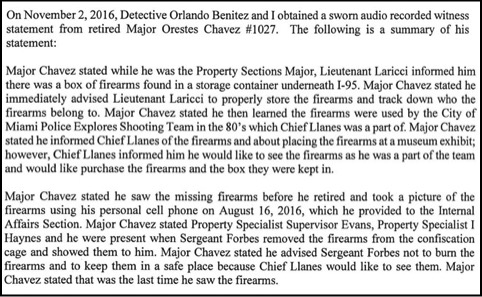

Here is the narrative summary of the interview of Sergeant Forbes conducted by IA, that was included in their Close Out Memo.
It's pretty clear upon listening to both, that either Chavez or Forbes' statement is untrue. Chavez claims that he he left the guns on the table, and Forbes claims that he picked up the box with the guns and walked them and Chavez to the door of his office, just inside the entrance to the Property Room, where he handed the box with the guns to Chavez.
At this point, this is a he said, he said standoff. However, there were 2 other people present when all of this happened.
Here are the narrative summaries of their statements:
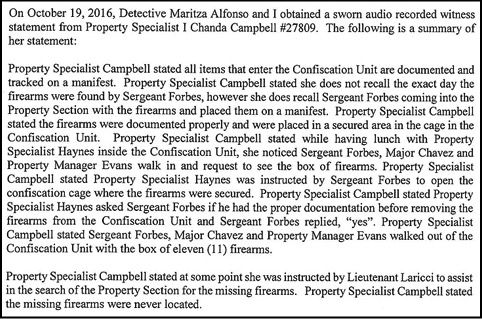
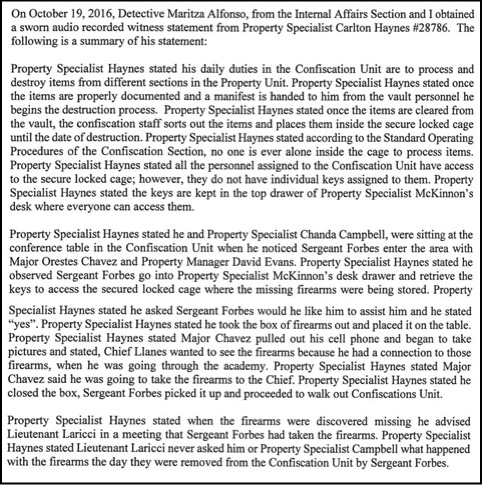
The interjection of Lieutenant Vincent Laricci as the person who brought the guns to his office support the contention that the Chief's statement represented an act of collusion in the theft of the guns.
His willingness to lie - and there is absolutely no evidence or witnesses to support his claim that Laricci was ever in his office during this time - appears to be little more that trying to provide Chavez with what amounts to an alibi by naming the only other command officer in charge of the Property Room having had access to the pistols as an alternative possible suspect in the removal of the guns was understood by many who learned of what the Chief had done as an effort to muddy the waters in a potential criminal investigation involving a high-ranking member of his command staff, who from the beginning had been acting on his behalf in this gun issue.
If Laricci HAD brought the guns to the Chief's office, then he would have become the last person seen with at least 3 of the guns, and that in turn would create a problem for going forward with a criminal case of theft against Chavez.
Understandably, Laricci when questioned, denied ever going to the Chief's office, or taking any guns to the Chief's office. Below is the narrative summary of his IA interview, followed by the audio clip from the actual interview where he is questioned repeatedly about this.
It should be noted that all of the secretaries in the Chief's office were also questioned, and none of them ever saw Lieutenant Laricci come to the Chief's office during the time period in question with, or without guns in hand. Their statements can be found in the IA Summary/Closeout. HERE.
On March 30, 2017, FDLE Special Agents Michael Stein and Special Agent Supervisor Robert LeFiles went to the Miami Police Department headquarters to conduct a voluntary interview with Chief Llanes. The interview lasted 9:44. Notice how this summary describes the guns being brought to the Chief's office.
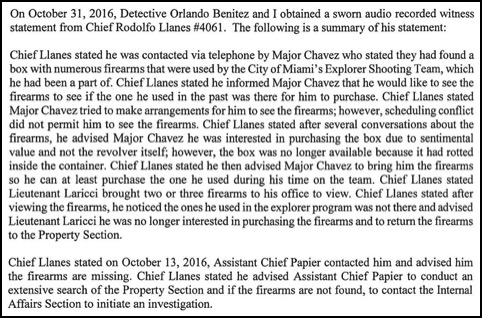
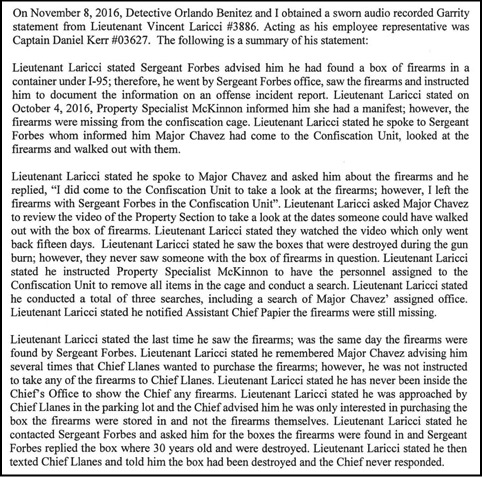
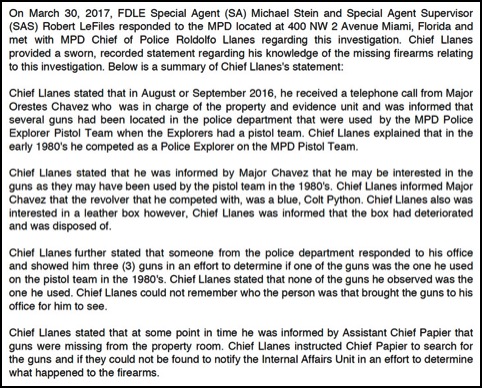
Instead of identifying Lieutenant Laricci as the person who showed up with 3 pistols as the IA interview did, it now becomes, "someone from the police department responded to his office and showed him three (3) guns..."
In fact, that's not an accurate description of what the Chief actually said. Here is the portion of the audio tape of that interview. .
Five months after the theft of the guns, the Chief could still, with great specificity, describe the number of guns that he saw, and how they were individually wrapped, but was now confused as to whether Lieutenant Laricci was the person who showed up in his office with the guns.
For this demonstration of mental confusion the taxpayers of Miami paid him over $200,000 a year in salary and benefits for the last 3 years.
Of course neither Special Agent Stein, or his boss Special Agent Supervisor Lefiles saw any need to ask any penetrating questions, like maybe:
'Well Chief, if you now don't think it was Laricci who
brought the guns to your office, who else do you think
it might have been?'
Instead of treating these high ranking cops as potential criminal suspects, the available record of investigative reports and audio interviews show that FDLE Special Agent Stein treated Llanes and Chavez as colleagues who just happened to inconveniently be at the center of a misunderstanding caused by a lack of proper paperwork.
PART VII - "HE'S MY COMMANDER, HE'S ACTING ON BEHALF OF THE CHIEF OF POLICE..."
What started out innocently as the discovery of 11 rusted revolvers and a couple 22 rifles and shotguns, in short order became a real who-done-it, with the only logical suspects being the Chief of Police Rudy Llanes and Major Orestes Chavez, a trusted member of his command staff.
The Chief had repeatedly expressed an interest in, and reason to want at least one of the revolvers, and the Major, who having described himself in the voluntary interview that he gave to the FDLE - accompanied by a lawyer - as a "cop and part-time actor," are the only ones who expressed an interest in, and an ability to get the guns out of the Property Room.
The "part-time actor" part is important because Chavez admitted in the FDLE interview that the Chief - before the guns had been discovered - had done him a great favor by allowing his office to remain untouched after he retired so that he and his girlfriend - a local actress - could film scenes for the TV series that they were planning to produce after he retired. (I wrote about all of that at the time HERE.)
None of the other 21 individuals questioned as part of the IA investigation had, or expressed any interest in these guns, which you would think would be enough to at least make FDLE Special Agent Stein treat anything that Llanes and Chavez said with some suspicion.
Perhaps he might have, had it not been for the lifeline that Sergeant Alvin Forbes unknowingly gave to Chavez the day that he walked him to the front door of the Property Room and handed him the box with the 11 revolvers.
Let's look at a portion of the summary of Forbes' IA statement again.
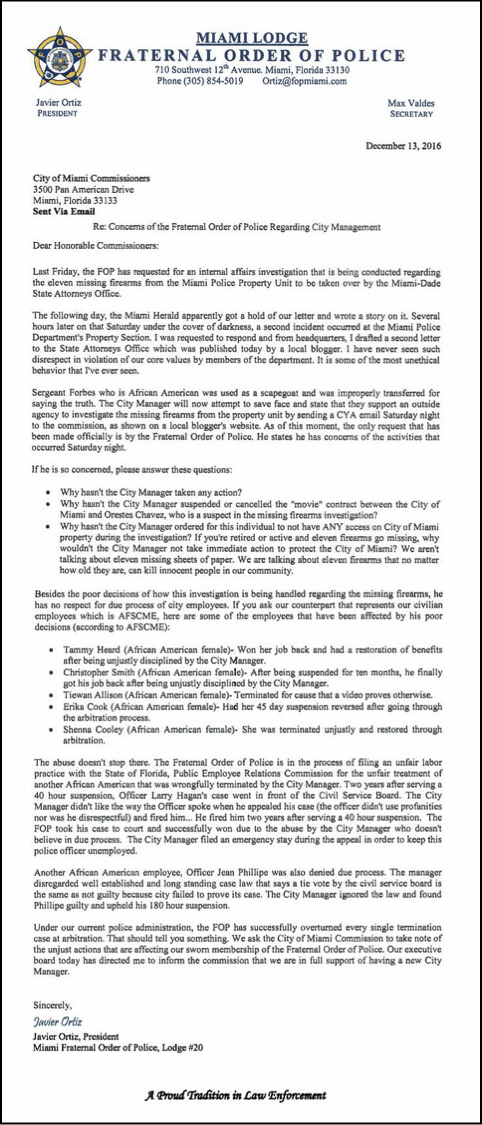

The failure of Forbes to get Chavez to sign off for the guns before he gave them to him is troubling, and clearly represents a failure to follow standard operating procedures, but there is no evidence that it was some part of a nefarious act on his part.
Rather, what Forbes says he did that day represents what happens every day in thousands of offices when a superior shows up and asks a suborniate to do something that the suborniate feels comfortable enough in doing off-the-cuff because he believes that superior won't screw him.
That is what happened on August 16th, when Forbes, recognizing that Harolenna McKinnon, the woman who handled all the paperwork for his unit was off that day, took it on his own to give the guns to Chavez believing that Chavez would, as he said, take the guns to the Chief and then return them.
The best way to understand what Forbes' did, and why, is to listen to this portion of the statement he gave IA that where he describes his reasoning for giving the pistols to Chavez, and also what happened when Lieutenant Laricci texted Chavez and asked him to come and sign for the pistols.
The reason that Chavez believed he could bluff his way through the allegations made by Forbes and the others in the Property Room that he said he was taking the guns to the Chief - and took the box of guns was that, as Forbes states above, Chavez never signed for the guns, and neither did Forbes.
In the bureaucratic world, if there's no paper trail, then one can argue that it never happened, which is obviously what occurred to whoever took the guns.
FDLE Special Agent Stein was all to happy to go along with this conclusion by writing the following justification for closing out the investigation by claiming that there was "inconclusive documentation" of whether the guns, like Elvis, had ever left the building.
In their usual fashion, when confronted with misbehavior in the police department, the members of the City Commission refused to deal with these problems.
PART IX - SUBPEONAS? SUBPEONAS? WE DON'T USE NO STINKEN SUBPEONAS. WHAT'YA THINK WE'RE DOING HERE, CONDUCTING A POLICE INVESTIGATION
While the transfer of Forbes from the Property Room was seen by many within the police department as punishment, it also had a larger and more important impact on the subsequent FDLE investigation, because once the case was transferred to the FDLE, Special Agent Stein attempted to reach out to some of the individuals, including Lieutenant Laricci, Carlton Haynes and David Evans who had been in the Confiscation Unit the day that Chavez came in to get the pistols to provide voluntary statements.
They all refused.
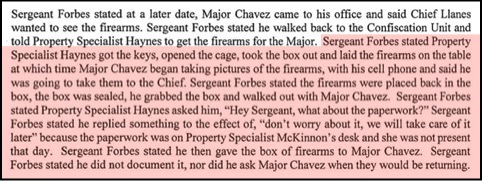
Because the narrative summary of the audiotaped interviews do not necessarily convey what was actually said, I will throughout this story also include portions from the audio tapes that I was able to obtain so that you can get a fuller understanding of what was said, which includes a lot of information that never made it into the narrative summaries.
Here is the portion of Sergeant Forbes IA interview describing what happened when Major Chavez came to his office to get the pistols so he could take them to the Chief.
Sgt. Alvin Forbes Audio (1)
There is no question that Forbes ended up making a serious error of judgment in believing that Chavez would not screw him. because based on the sworn testimony of the individuals who either witnessed Forbes and Chavez walk away from the Confiscation Section with the box of pistols, or the individuals who were told of this encounter in the time period between when that happened and the pistols were declared missing all support the claim that Chavez lied when he stated that the last time he saw the pistols was on the table inside the Confiscation Unit as he walked out.
PART VIII - NO GOOD DEED GOES UNPUNISHED: THE ONLY GUY WHO GOT PUNISHED AS A RESULT OF THE PISTOLS BEING STOLEN WAS THE BLACK GUY
Within weeks after the pistols were discovered missing, Forbes, a 20 year veteran of the Property Room was summarily transferred to patrol in Little Haiti.
It was his reward for cutting corners to do a favor for a boss who he thought was a stand-up guy.
He is the only person to have been punished in any way for this incident, and the actions by the department against Forbes prompted the following letter by the Fraternal Order of Police to the members of the Miami City Commission detailing their concerns over how the IA investigation was being handled, and calling for an independent investigation. The letter included the highlighted paragraph pointing out that they believed that Forbes was being scapegoated.
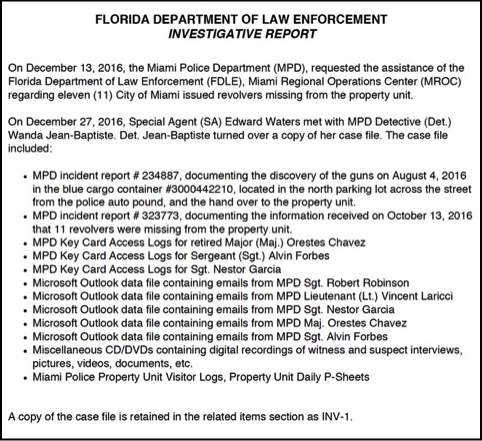
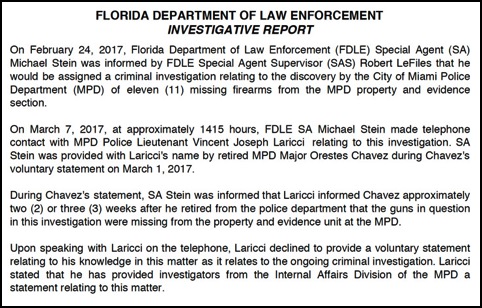
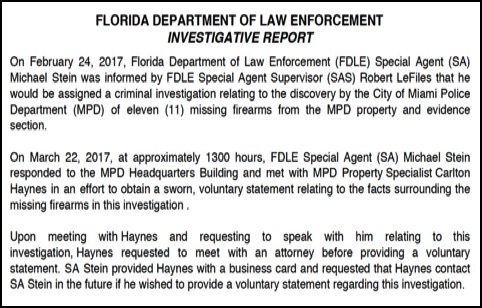
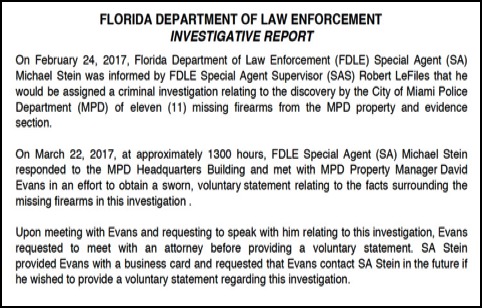
The refusal by these individuals was clearly understandable, because as the saying goes, "No good deed goes unpunished," and having watched Forbes get transferred for sticking his neck out for what be believed was a simple favor for Major Chavez and the Chief, it was obvious that none of these individuals were interested in voluntarily giving any statements that might result in punishment for the Chief or Chavez, and would, no matter what, result in something bad happening to them.
Among all the other bad things that police departments are known for is going out of their way to fuck over employees who cross over the "Thin Blue Line."
And this is where it becomes apparent that the FDLE and Special Agent Stein really had little interest in conducting a real investigation.
In all of the FDLE cases that I cited at the beginning of this story, all of them had one thing in common: the FDLE persuaded these cases by obtaining subpoenas for records and/or testimony from people who didn't want to talk with them.
The use of subpoenas is central to any serious investigation, and the refusal of Stein to use subpoenas to get these individuals to come in for interviews is about as clear a sign - other than a billboard saying "Move On, Nothing To See Here" - that he wasn't going to go out of his way into actually conducting a real investigation.
Nor is this the only telltale sign that this was never going to be a real investigation.
In some of the taped interviews you hear mentions of text messaging between some of the individuals including Lieutenant Laricci and Major Chavez. Almost everyone today uses text messages, and obtaining copies of text messages is considered a basic part of conducting most kinds of investigations where communication between individuals has taken place.
Here is the detailed list of all of the evidence that was collected by the IA Unit investigators and turned over to the FDLE.
In today's crime fighting world, issuing a subpoena for text messages is the equivalent of dusting for fingerprints 50 years ago.
PART X - HOW THE FDLE CLOSING OUT THE CASE RESULTED IN ORESTES CHAVEZ GETTING HIS $276,317.03 FROM THE POLICE 1% ACCOUNT
Not only did Orestes Chavez walk away from the allegations that he was the one who walked out of the Property Room with the 11 revolvers but the FDLE seems to expedited the closing of this investigation so that he could collect the money from the MPD's 1% Fund.
When Chavez retired at the end of September 2016, part of his retirement package included a payment of $276,317.03 from what is known at the 1% Fund - a fund that I am not totally knowledgeable about - but supposedly has something to do with a 1% payment being made into this fund by insurance sales within the city that is then put in a fund that is shared with all retiring police officers.
When the investigation was transferred to the FDLE, and Chavez became a possible subject, he became unable to collect this money.
On March 1, 2017, Chavez, accompanied by his attorney went to the FDLE Regional Headquarters in Miami to give a voluntary statement.
No where in the summary of that statement does it mention anything that Chavez said about that money.
Here is the narrative summary.
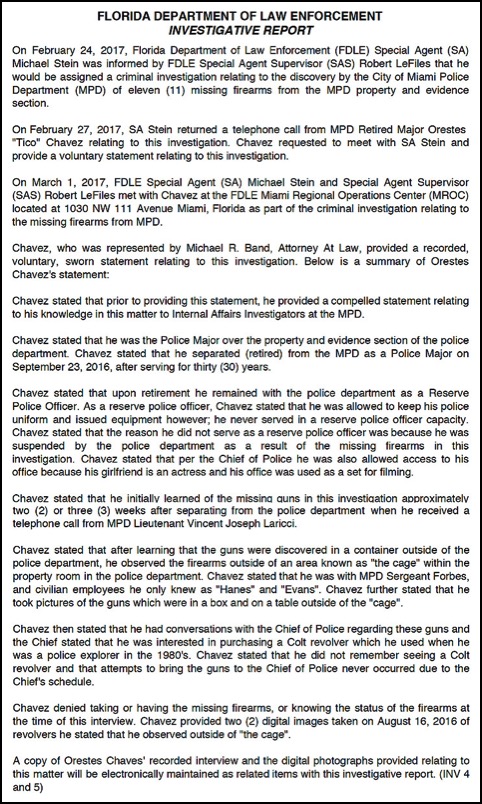
Here is the portion of the Chavez interview where he talks about the 1% Fund, and how important that money was to him.
Major Orestes Chavez Audio
I don't think it would have taken Sherlock Holmes, the cops on NYPD, or even an FDLE Special Agent after listening to the above comments to figure out that perhaps the best way to put some pressure on Chavez to see if in fact he might be lying when he claimed - in contradiction to everyone else who was present in the room that day - that he didn't walk out of the Confiscation Unit with Sergeant Forbes and the box of pistols, was to use the release of that money as a motivator.
Nothing like that happened. Instead, shortly after May 25th, a copy of Stein's Close Out Report was forward to the folks at the 1% Fund, and soon after Chavez gor his check.
PART XI - CLOSING IT OUT: MOTIVE AND OPPORTUNITY
Even after this detailed review of the available evidence there still remain outstanding issues, and questions including the question about whether or not the pistols were included in the September 27th Gun Burn, justifying the claim that the pistols were "destroyed," or "misplaced."
In another significant portion of an interview that didn't make it into a narrative summary, below is a portion of Lieutenant Vincent Laricci's statement, where he explains the steps that were taken once the pistols were reported missing, including getting a copy of. and reviewing the video tape of the process used to verify the manifests that made up that September 27th Gun Burn, as well as the procedures that were used to search the Property Room for the pistols.
Here is that portion of Laricci's statement:

Lt. Vincent Laricci Audio (2)
Secondly, of all the things that the police department does, this is one of the few that it does with real professionalism. Here is the description of the process that is followed, and who is involved, as memorialized in the Property Unit Weekly Report for October 11, 2016.
So while it's always possible that someone decided to sneak into the Property Room, make their way through the security system and either substitute, or slip the 11 revolvers into one of the boxes of guns scheduled for destruction, the question that remains is, who would have done that?
If you read and listened to Sergeant Forbes' version of what he did with the pistols, you would therefore have to believe the statements of the others in the Confiscation Unit that day who all claimed to have watched Forbes and Chavez walk out of the Unit with the box of guns. That that occurred on August 16th.
Then, you have the Chief's statement that he not only was shown 3 pistols in his office, but was even able to describe how they were wrapped.
That means that even if it was by Hocus-Pocus, at least 3 of those pistols managed to be removed from the Property Room and delivered to the Chief's Office by someone.
If 3 guns were taken, you kinda got to go along with the possibility that all 11 pistols were all taken and not just 3.
If you believe all that, then for the guns to either have been "destroyed" or "misplaced," in te Gun bUrn, or inside the Property Room, they would have had to have been brought back to the Property Room, and that doesn't make much sense, does it?
Also, there are the issues of motive and opportunity?
There has been a great deal of speculation since the pistols went missing as to why all of this happened.
I'm going to side-step all of that because I don't believe we'll ever know why the guns were taken, or what happened to them after all the hoopla that occurred once it was discovered they were missing.
I've tried to deal here with the information that was made available either through public records, or through sources which prompted my original stories about this incident starting in October of 2016.
My conclusions, formed at that time, and which I still hold, is that if this incident had involved a couple regular cops and not the Chief of Police and one of his command staff, not only would this entire investigation have been conducted differently, but so would the outcome.
I am also, having reviewed the handling of this case by FDLE Special Agent Michael Stein, convinced that because of his involvement with the Miami Police department in reviewing the shootings of civilians by MPD police, he should never have been assigned to this case.
In addition, if this is the quality of his work product, then all of the cases that he has handled in recent years reviewing the shootings by members of the Miami Police Department should be serious reviewed by outside, independent investigators hired by the families of the individual shot.
From questions not asked, to subpoenas not sought, to a deference not deserved, this investigation was not the FDLE's finest hour.
Chief Rudy Llanes Audio
Major Orestes Chavez Audio
Lt. Vincent Laricci Audio
Sgt. Alvin Forbes Audio
COMPLETE AUDIO INTERVIEWS
